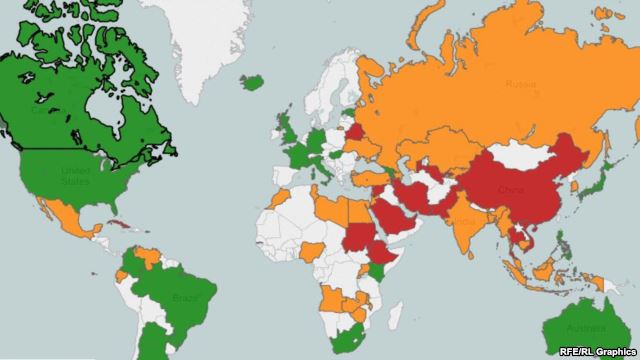By RFE/RL | —
A U.S.-based rights watchdog says Internet freedom around the world has deteriorated for the fourth consecutive year, with the steepest declines in Russia, Ukraine, and Turkey.
In its “Freedom On The Net 2014” report, released on December 4, Freedom House says that Iran, Syria, and China are the world’s worst abusers of overall Internet freedom.
The report, which covers the period between May 2013 and May 2014, assesses the level of Internet and digital-media freedom in 65 countries, with each receiving a score from 0 for the most free to 100 for the least free.
It says that of the 65 countries assessed, 36 have experienced negative trends since May 2013.
Based on the scores, the report ranks countries as free (0-30 points), partly free (31-60 points), or not free (61-100 points).
INFOGRAPHIC: World Map Of Internet Freedom
Of the countries in RFE/RL’s broadcast area that are covered by the report, only two are ranked as free: Georgia, with 26 points; and Armenia, with 28 points.
Ukraine (33 points), Kyrgyzstan (34), Azerbaijan (55), Russia (60), and Kazakhstan (60) are among countries in the “partly free” category.
The report says that Russia’s score fell by 11 points over the past five years. It says that since Vladimir Putin’s return to the presidency in 2012, authorities have implemented legislation to block online content, critical or opposition media outlets, and mentions Putin’s signing a bill authorizing the blocking — without judicial oversight — of any website that hosts content deemed as “extremist” or calls to protest.
The Freedom House paper says the bill, which became effective in February, was used to crack down on websites critical of Russia’s actions in Ukraine.
Ukraine’s ranking declined five points, mostly because of violence targeting social media and online journalism during the Euromaidan protests, and additional evidence revealing that ousted President Viktor Yanukovych’s government had been keeping activists, journalists, and political opponents under Internet surveillance.
The report mentions Azerbajian’s moves to expand criminal defamation to Internet content, further muzzling government criticism. It notes the case of Khadija Ismayilova, a journalist for RFE/RL’s Azerbaijani Service, who has repeatedly been subjected to blackmail and gender-based smear campaigns.
Iran (89), Uzbekistan (79), Pakistan (69), and Belarus (62) are states where the Internet is not free.
The paper says that Iran remains the worst country in the world for Internet freedom, despite initial hopes over the election of reformist President Hassan Rohani. It says the government continued to hand down harsh punishments, sentencing people to lengthy jail terms for promoting Sufism online, among other online activities.
In Pakistan’s case, it mentions the case of a woman who was stoned to death by local men in June 2013 after a tribal court found her guilty of possessing a mobile phone.
The report notes an improvement in Belarus, where authorities eased enforcement of some restrictions, but mentions the case of a blogger who exposed police corruption and was subsequently harassed and forced to undergo a psychiatric evaluation.
The report says that, from May 2013 to May 2014, some 41 countries adopted or proposed laws to penalize free speech online, step up control over Internet content, or expand Internet surveillance.
The United States, while ranked the sixth-most-free country in terms of internet use, saw a two-point decline over the past year.
But the report says that efforts to reform U.S. surveillance legislation gained momentum in the aftermath of revelations by former National Security Agency contractor Edward Snowden.
Mirrored from RFE/RL
Copyright (c) 2014. RFE/RL, Inc. Reprinted with the permission of Radio Free Europe/Radio Liberty, 1201 Connecticut Ave NW, Ste 400, Washington DC 20036.




 © 2026 All Rights Reserved
© 2026 All Rights Reserved